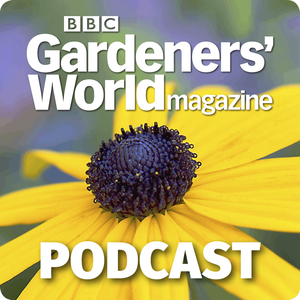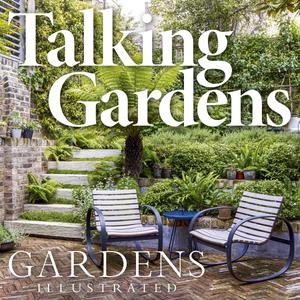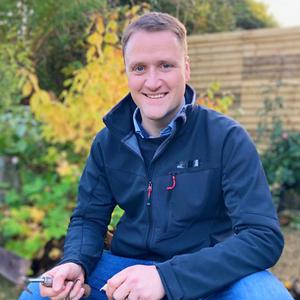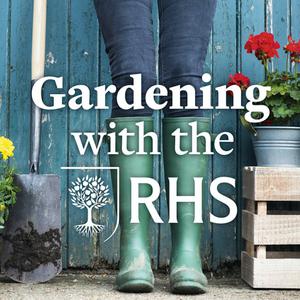
Roots and All - Gardening Podcast
Sarah Wilson
- 24 minutes 10 secondsEpisode 319: New Build Gardens
Andrew Jackson is changing the future of garden spaces for new builds with his groundbreaking initiative, the New Build Manifesto. Drawing on over a decade of experience as a Director in social housing, Andrew is now channeling his expertise to advocate for better quality garden spaces that benefit both homeowners and nature. His campaign brings together developers and homeowners to create enriching outdoor environments that enhance living experiences and support biodiversity.
Links
Instagram @thenewbuildmanifesto
Other episodes if you liked this one:
If you liked this week's episode with Andrew Jackson you might also enjoy this one from the archives:
305: Building on Nature - What feature does a wildlife supporting landscaper refuse to install in a garden? What is the most beneficial addition for wildlife? And how can hard landscaping be compatible with wildlife and nature? This week my guest is former ecologist and founder of NatureScaping, Nick Townsend, who sheds light on building greener gardens. Nick uses his knowledge of ecology and the environment in his landscaping business in order to make better gardens and outdoor spaces for wildlife.
251 - Green Roofs and City Wildlife - This episode, my guest is green roof guru, urban designer, photographer, birdwatcher, punk ideologist and all-round straight talker Dusty Gedge. We talk about green infrastructure, encouraging species back into landscapes, how to maintain landscapes for habitat value and what’s being and can be done to up the green value of public spaces.
20 January 2025, 4:00 am - 26 minutes 53 secondsEpisode 318: Care Not Capital
Returning guest John Little is on a collaborative mission to revolutionise the way we care for green spaces in order to ensure they deliver for people and for wildlife. John has set up a new initiative called Care Not Capital which is about investing in gardeners and recognising them as the key piece they are in the green spaces jigsaw.
Links
Other episodes if you liked this one:
If you liked this week's episode with John Little you might also enjoy this one from the archives:
53: John Little of The Grass Roof Company - This week I’m speaking to John Little. John founded the Grass Roof Company in 1998 and for the past 20 years, he’s been designing and implementing gardens in public spaces that work for people, for plants and for wildlife.
Often working in urban locations, he installs wildlife habitats and planting in some unusual places including on roofs and structures such as cycle shelters. He also includes many edible plants in his schemes in order to create beautiful and useful spaces that engage the community.
Maintenance and management is a key focus, and is vital to the success and longevity of his projects. We also talk about the need to revise traditional maintenance practices in order to reduce costs, save time and preserve wildlife.
239: Growing Biodiversity - My guest this week is gardener Benny Hawksbee. Benny has a background in biology and gardens with one eye on biodiversity. His projects include the Eden Nature Garden, a community garden designed to be a haven for people and wildlife, and John Little’s garden in Essex. We talk about how Benny brings biology and ecology into his work, what we can all do to garden for wildlife whilst reducing our input in terms of resources and how we can involve the community in building and using gardens that work for everyone.
13 January 2025, 4:00 am - 20 minutes 46 secondsEpisode 317: The Lawnmower
I'm joined by Clive Gravett, founder of The Budding Foundation and The Museum of Gardening. Clive is a passionate advocate for preserving gardening history, and he's here to share fascinating insights into the history of the lawnmower—an invention that revolutionised gardening as we know it. We also touch on the important work of The Budding Foundation in supporting education and young people through gardening.
Links
Museum of Gardening: Visit the Museum of Gardening's official website at https://www.museumofgardening.co.uk. The museum is located at the South Downs Heritage Centre in Hassocks, West Sussex, and explores the history of gardening through its unique collection of tools and artefacts.
Budding Foundation: You can learn more about and support the Budding Foundation at https://www.thebuddingfoundation.co.uk. This foundation is closely associated with the Museum of Gardening and focuses on educational projects and preserving gardening history.
Please support the podcast on Patreon
16 December 2024, 4:00 am - 20 minutes 34 secondsEpisode 316: The Dry Exotic Garden
Explore the extraordinary world of exotic gardening with Paul Spracklin, author of The Dry Exotic Garden. Paul shares his infectious passion for transforming gardens conditions into lush, visually striking landscapes using drought-tolerant plants. Tune in to hear about the inspiration behind his book, the unique joys of cultivating exotic species, and the techniques that make gardens with drought loving plants not just possible, but breathtakingly beautiful.
About The Dry Exotic Garden
Discover everything you need to know about designing, choosing and planting cacti and succulents to create a drought-tolerant garden in this lavishly illustrated guide with experts forecasting reduced summer rainfall, xeriscaping – the practice of landscaping with minimal water – is now a popular choice for many gardeners.
Links
The Dry Exotic Garden: A Gardener’s Guide to Xeriscaping with Succulents by Paul Spracklin
Other episodes if you liked this one:
If you liked this week's episode with Paul Spracklin you might also enjoy this one from the archives:
161: The Jungle Garden with Philip Oostenbrink - This week’s guest is Philip Oostenbrink, Head Gardener at Walmer Castle and Gardens, Collections Coordinator for Plant Heritage in Kent, Plant Trials committee member for the RHS and self-confessed jungle plant nut. Philip has just published a new book titled ‘The Jungle Garden’ and in this interview, I talk to him about what a jungle garden is, whether they can work in shady and sunny aspects, easy jungle plants, rarer ones, plant hardiness, seasonal and winter interest and where to get plants.
175: Seeking Rare Plants - This week’s guest is Nick Macer, plant hunter, self-taught botanist, rare species expert and owner of Pan Global Plants, a nursery based in the Severn Valley, which, to quote the website, offers “a selection of the finest, most desirable and often rarest plants capable of growing on these isles”. And that’s key – Nick hand selects plants, in the past, directly from where they were growing in the wild and brings them into cultivation. He’s renowned for choosing sublime varieties and for openly sharing his knowledge and experience. I did intend to talk to Nick a bit about his plant hunting trips, but as a stop has been put to these recently due to rules around the transportation of plant materials, the conversation went in other directions.
9 December 2024, 4:00 am - 29 minutes 8 secondsEpisode 315: Interview with Mark Gregory
Prepare to be inspired! I am chatting with legendary landscape designer Mark Gregory, founder of Landform Consultants. With over 35 years of experience and a treasure trove of RHS Chelsea Flower Show awards under his belt, Mark shares his take on creating breathtaking gardens, the artistry of garden design, his career and the landscaping business. This interview is a great insight into a career spent crafting perfection!
Links
Other episodes if you liked this one:
If you liked this week's episode with Mark Gregory you might also enjoy this one from the archives:
278: Sustainability Matters - My guest this week is Nadine Charlton. Through her business Home Spring Gardens, Nadine provides specialist services to the horticultural and landscape construction industry, advising on sustainable best practice and creating beautiful gardens and landscapes with an environmental conscience. We talk about the importance of sourcing sustainable garden products, how you can tell whether what you’re buying is sustainable and whether enough is being done on this front.
127: John Brookes with Gwendolyn van Paasschen - This week, I’m speaking to Gwendolyn van Paaschen about the legendary garden designer John Brookes. Gwendolyn is the owner of Denmans Garden and chairman of the John Brookes-Denmans Foundation. Gwendolyn’s book (released 7th Oct) ‘How to Design a Garden’ brings together a collection of John’s works from across his lengthy career, disseminating the fundamental principles which underpinned his design work, in a way that is useful to both professionals and home gardeners. Gwendolyn is carrying on John’s work at Denmans by opening the garden to the public and as she puts in at the end of the interview, keeping his conversation going.
2 December 2024, 4:00 am - 22 minutes 5 secondsEpisode 314: Nurturing Growth, Inside and Out
Get ready for an inspiring journey as I’m joined by RAF Warrant Officer Pete Welsh—a man whose story spans the adrenaline of military life to the quiet power of the garden. While excelling in a remarkable military career and contributing to an RHS award-winning community garden, Pete has also confronted the profound challenges of mental health. Through the therapeutic calm of gardening and the transformative power of community connections, he’s found resilience and growth. Pete’s journey reveals the extraordinary parallels between cultivating plants and healing ourselves.
Links
Veterans' Growth: A charity focused on providing horticultural therapy to veterans dealing with mental health challenges. You can visit the official site at veteransgrowth.org
Tadpole Garden Village: This community initiative has a focus on gardening and sustainability. You can find more information about their activities and community updates through their dedicated website at tadpolegardenvillage.com
Other episodes if you liked this one:
If you liked this week's episode with Pete Welsh you might also enjoy this one from the archives:
286: Natural Happiness - This episode my guest is Alan Heeks, former corporate world inhabitant, organic farmer, coach and author of the book ‘Natural Happiness’. After his transition into organic farming, Alan realised that “a cultivated organic ecosystem is a profound guide to tending human nature, and that organic growth methods have parallels for people: such as composting your stress, and using crop rotation to avoid burnout.” We explore the idea further…
145: Therapy Gardening - In this episode I’m speaking to horticultural therapist Carol Sales. Carol headed up a therapy garden in a prison, before moving over to lead the Therapy Garden at Headley Court, a rehabilitation centre for injured military veterans. Carol is featured in many books, including Head Gardeners by Ambra Edwards and Sue Stuart-Smith’s The Well Gardened Mind and she was awarded the British Empire Medal in 2019.
25 November 2024, 4:00 am - 23 minutes 48 secondsEpisode 313: Plants for Shade
Your garden’s shadows can actually be stunning, vibrant spaces! In this episode, I chat with Susanna Grant, author of Shade and founder of the London-based shady plant shop, LINDA. Susanna joins me to discuss shade-loving plants and how to bring life and vibrancy to those darker corners of our gardens.
About Susanna Grant
Susanna Grant is founder of Linda, a garden designer, planting specialist and writer, author of Shade (Quarto). She organises the Spring Plant Fair at The Garden Museum, and The Autumn Plant Fair at Arnold Circus where she is a volunteer and a trustee.
Links
Susanna Grant on Instagram @hellotherelinda
Shade: Work with the light, grow the right plants, bring dark corners to life by Susanna Grant
Other episodes if you liked this one:
236: Mosses - This week, my guest is Dr Neil Bell, bryologist at the Royal Botanic Garden Edinburgh and author of The Hidden World of Mosses, which takes a look into the minute and fascinating world of bryophytes. If you’ve ever wanted to know how these plants live and reproduce, whether you can cultivate moss indoors or outdoors, what that green stuff is you find on the surface of potted plant’s compost and whether you should take it off, the environmental and habitat value of mosses and how they are affected by the moon, listen on…
23: Ivy With Fibrex Nurseries - Key talking points covered are; Growing ivy as a houseplant, Ideal growing conditions for ivy indoors, Ideal growing conditions for ivy outdoors, Different growth habits and the suitability of certain species for certain garden situations, Fast and slow growing varieties, Pruning, Benefits to wildlife, Unsuitable situations for ivy,
Please support the podcast on Patreon
18 November 2024, 10:00 am - 23 minutes 24 secondsGardening for Amphibians
Will Johansen is from Froglife, a conservation group devoted to protecting amphibians and reptiles. Will’s here to discuss practical ways we can support amphibians in our gardens, from building simple ponds to creating safe spaces where they can thrive. Will gives tips and advice to help you make a real difference for these often-overlooked creatures.
Links
Other episodes if you liked this one:
If you liked this week's episode with Will Johansen you might also enjoy this one from the archives:
292: Spiders - This week, my guest is Meg Skinner. Meg works as an invertebrate ecologist, surveying sites for protected species and volunteers for the British Arachnological Society. We’re talking today about spiders in your garden; how they go about their business, how you can encourage more, to visit your garden, oh and we talk about the much maligned false widow…
303: Slugs and Snails - Hello and welcome to this week’s episode where my guest is retired academic and lifelong gardener Jo Kirby. Jo has written The Good Slug Guide, the first-ever book on slugs and snails that explains why the usual controls often don`t work, what slugs and snails really get up to, what they really eat and – importantly – what eats them.
11 November 2024, 4:00 am - 23 minutes 34 secondsEpisode 311: Radical Rest
What if rest could be a radical act of resistance? In this episode, I talk with Evie Muir, author of Radical Rest, who challenges the myth that burnout can be cured by self-care alone. Evie offers a bold vision of rest as a communal, transformative practice grounded in Black Feminist and abolitionist thought. Tune in to explore how rest and time in nature can lead us from exhaustion and grief toward joy and resilience—and what it takes to build a world where we can all thrive.
About ‘Radical Rest: Notes on Burnout, Healing and Hopeful Futures’
We’re burnt out—drained, anxious, overworked, and unsupported. The answer cannot lie in occasional self-care practices when our exhaustion points to a much deeper societal problem. Self-improvement cannot truly help us within a system that demands so much while giving so little in return. Instead, we need a full reimagining that prioritises a thriving, abundant life.
Through a Black Feminist, abolitionist, and nature-focused perspective, Evie Muir invites us to envision a world rooted in radical rest. Muir explores what genuine rest would feel like and how it would reshape our experiences. They examine burnout’s core emotions—rage, grief, anxiety—and imagine the transformation toward hope, joy, and abundance that meaningful change could bring.
Muir speaks with those most affected by and resisting burnout: Black, queer, disabled activists of colour. Through their lived experiences, a vision emerges of a world where radical rest is communal, grounded in connection—with each other, our bodies, and the natural world.
Links
‘Radical Rest: Notes on Burnout, Healing and Hopeful Futures’ by Evie Muir
Evie Muir on Instagram: @xeviemuir
Other episodes if you liked this one:
If you liked this week's episode with Christian Douglas, you might also enjoy this one from the archives:
242: Soil: The Story of a Black Mother’s Garden - This week’s guest is poet and scholar Camille Dungy. Camille has documented how she diversified her garden to reflect her heritage in her book ‘Soil: The Story of a Black Mother’s Garden’. We talk about the politics of gardening, planting a nature garden and how nature writing has influenced our gardens in the past and how it can shape the way we do so in the future.
86: Nicole Rose of Solidarity Apothecary - This week I’m talking to anarchist organiser, agroecologist and grassroots herbalist, Nicole Rose. Nicole runs the Solidarity Apothecary, an organisation supporting mainly prisoners and refugees either by supplying herbal remedies or by facilitating the growing and making of these. We talk about Nicole’s work to help prisoners, refugees and other facing state repression by helping them with their physical and mental wellbeing through a connection to nature.
4 November 2024, 4:00 am - 22 minutes 49 secondsEpisode 310: Designer Food Garden
Christian Douglas is redefining vegetable gardening with a focus on style and functionality. Drawing on examples from urban and rural gardens, including his own garden in Marin County, he offers practical advice on growing a variety of vegetables, fruits, and herbs. Christian talks about how to assess lighting and soil, pick plants suited to the climate, and discover creative edible alternatives to traditional landscape plants. Looking at spaces from small city gardens to large rural plots, and even a rooftop space, his new book 'Food Forward Garden Design' offers guidance on how to create a purposely designed and beautiful kitchen garden.
Links
Food Forward Garden Design: A Complete Guide to Designing and Growing Edible Landscapes by Christian Douglas, foreword by Tyler Florence
Christian Douglas on Instagram: @christian_douglas_design
Other episodes if you liked this one:
If you liked this week's episode with Christian Douglas, you might also enjoy this one from the archives:
214: Food Forests for Plant Lovers - This week’s guest is permaculture designer and author of ‘The Plant Lover’s Backyard Forest Garden’, Pippa Chapman. Growing our own food is becoming more and more important, and Pippa has tips on creating a year-round food forest that is low-maintenance and good for wildlife, that can work in a variety of aspects and that is an enjoyable and beautiful space for people too.
52: Crops in Tight Spots with Alex Mitchell - This week I’m speaking to Alex Mitchell, aka the Edible Gardener. Alex is the gardening columnist for the Evening Standard and author of five books on gardening, including her latest ‘Crops in Tight Spots’. I speak to Alex about growing edibles when space in tight and she has some brilliant tips and tricks about how to grow, what to grow and what not to bother with. Alex’s book is based on years of experience and I respect her approach of trialling, experimenting (including catching pupae in jars and observing them as they hatch!) and just giving things a go. As a result of this hands-on experimentation, she’s developed some nifty time, money and space-saving methods and she shares some of those with us in the episode. For the rest, you’ll just have to buy the book!
28 October 2024, 4:00 am - 25 minutes 3 secondsEpisode 309: The Seed Hunter
Mitch McCulloch is redefining how we grow and cook with plants. He’s is a former chef, turned seed hunter and gardener, who applies his culinary knowledge when choosing and cooking with the produce he grows. Not only does he select the most diverse and interesting varieties, he gets creative with how he serves up his produce. His new book The Seed Hunter is properly inspiring if you’re both a cook and grower and you want to get the absolute most out of your edible plants.
About Mitch McCulloch
Author, seed hunter, and gardener with a passion for promoting and preserving rare heirloom food crops. A former chef from London, Mitch has turned his culinary expertise toward a quest to safeguard the rich, diverse flavours our world has to offer. Currently, he explores the globe in search of unique fruit, vegetable and flower seeds, documenting and preserving them to ensure that future generations can experience the delicious heritage and beauty of our past. Through his work, Mitch aims to champion and protect the biodiversity of our food system, one seed at a time.
Links
The Seed Hunter: Discover the World's Most Unusual Heirloom Plants by Mitch McCulloch
Mitch on Instagram: @mitch_grows
Other episodes if you liked this one:
If you liked this week's episode with Mitch McCulloch, you might also enjoy this one from the archives:
287: Heirloom Vegetables - This episode my guest is former jewellery designer to the stars, turned social media veg grower, Lucy Hutchings. Along with music festival organiser, Kate Cotterill, Lucy set up SheGrowsVeg, an heirloom seed company which is bringing the most unusual veg, fruit, and edible flowers to veg patches and plates everywhere.
188: Huw Richards on Veg Growing - This week’s guest is veg growing expert Huw Richards. Huw grows a vast range of plants in his garden in mid-West Wales and is always trialling and experimenting with new ways of growing. He has an enormously popular YouTube channel and has authored a number of books, the latest of which is ‘The Vegetable Grower’s Handbook’ which draws on his experience as very much a thoughtful and philosophical gardener.
21 October 2024, 3:00 am - More Episodes? Get the App
Your feedback is valuable to us. Should you encounter any bugs, glitches, lack of functionality or other problems, please email us on [email protected] or join Moon.FM Telegram Group where you can talk directly to the dev team who are happy to answer any queries.
 The Organic Gardening Podcast
The Organic Gardening Podcast
 BBC Gardeners’ World Magazine Podcast
BBC Gardeners’ World Magazine Podcast
 grow, cook, eat, arrange with Sarah Raven & friends
grow, cook, eat, arrange with Sarah Raven & friends
 Talking Gardens
Talking Gardens
 Gardeners' Corner
Gardeners' Corner
 Gardening with the RHS
Gardening with the RHS